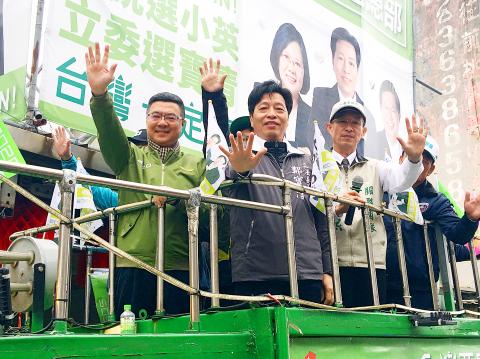Former premier Yu Shyi-kun (游錫堃), along with other Democratic Progressive Party (DPP) and pan-green camp leaders, yesterday condemned remarks by former president Ma Ying-jeou (馬英九) and others from the Chinese Nationalist Party (KMT) that compared passage of the Anti-infiltration Act (反滲透法) with the Martial Law era and claimed the nation had fallen victim to “green terror.”
Ma yesterday said: “Passing the Anti-infiltration Act is like restoring martial law in Taiwan. It was the darkest day and the most shameful day in the history of Republic of China Constitution.”
Yu lashed out at the former president at a DPP campaign event in Taipei.

Photo: Hsieh Wu-hsiung, Taipei Times
“You would know what martial law is like, Mr Ma... Taiwan suffered much during martial law under the regimes of the two Chiangs [Chiang Kai-shek (蔣介石) and his son, Chiang Ching-kuo (蔣經國)] and you know well how harshly they dealt with dissidents,” Yu said. “How can you compare the passage of the Anti-infiltration Act with living under martial law?”
“Ma has distorted the facts so much,” Yu added. “I feel that he has a malicious heart. Martial law was used to prosecute and oppress internal dissidents. Passage of the act was done to defend our nation against communist China’s infiltration and interference. It is to safeguard Taiwan — for peace and national security.”
Yu told supporters about reading a book by Lin Shu-zhi (林樹枝), a victim of the White Terror era who spent 12 years in prison for his role in the 1979 Kaohsiung Incident.
In the book, Lin wrote about his experiences during the Martial Law era and included research from government documents, writing that the authorities had executed at least 256 dissidents, handed down jail sentences to at least 6,000 people and tortured prisoners, Yu said.
“Ma, do you really know what martial law was like? Yu asked. “How many dissidents and political activists suffered the atrocities committed by your party?”
“The insinuation that the DPP is perpetuating ‘green terror’ is nonsense. The accusation comes from political parties and groups who take orders from China. Such talk does not benefit healthy debate in a democratic society,” Economic Democracy Union convener Lai Chung-chiang (賴中強) said.
“Many political parties and groups are spreading rumors and disinformation about how the act will be applied, but the provisions will not punish Taiwanese for going across the [Taiwan] Strait to meet with Chinese officials,” Lai said.
Lai said that many civic groups welcomed the act.
“The act can become an important weapon for us in fighting Beijing’s propaganda, with its ‘united front’ tactics, its political warfare and disinformation campaign to destabilize and eventually annex Taiwan,” he added.
Independent Legislator Freddy Lim (林昶佐), who is seeking re-election, said the legislature discussed the legislation for a long time, adding that KMT legislators did not voice much of an opinion, only bringing up vague concepts when it was their turn to speak about the legislation.
“The KMT has over the past year stood with with China on the protests in Hong Kong, amendments to the National Security Act (國家安全法) and deliberations on the Anti-infiltration Act,” Lim said. “The KMT’s stance and its opposition were exactly what China wanted. Are all of these just a coincidence?”

Alain Robert, known as the "French Spider-Man," praised Alex Honnold as exceptionally well-prepared after the US climber completed a free solo ascent of Taipei 101 yesterday. Robert said Honnold's ascent of the 508m-tall skyscraper in just more than one-and-a-half hours without using safety ropes or equipment was a remarkable achievement. "This is my life," he said in an interview conducted in French, adding that he liked the feeling of being "on the edge of danger." The 63-year-old Frenchman climbed Taipei 101 using ropes in December 2004, taking about four hours to reach the top. On a one-to-10 scale of difficulty, Robert said Taipei 101

Nipah virus infection is to be officially listed as a category 5 notifiable infectious disease in Taiwan in March, while clinical treatment guidelines are being formulated, the Centers for Disease Control (CDC) said yesterday. With Nipah infections being reported in other countries and considering its relatively high fatality rate, the centers on Jan. 16 announced that it would be listed as a notifiable infectious disease to bolster the nation’s systematic early warning system and increase public awareness, the CDC said. Bangladesh reported four fatal cases last year in separate districts, with three linked to raw date palm sap consumption, CDC Epidemic Intelligence

Two Taiwanese prosecutors were questioned by Chinese security personnel at their hotel during a trip to China’s Henan Province this month, the Mainland Affairs Council (MAC) said yesterday. The officers had personal information on the prosecutors, including “when they were assigned to their posts, their work locations and job titles,” MAC Deputy Minister and spokesman Liang Wen-chieh (梁文傑) said. On top of asking about their agencies and positions, the officers also questioned the prosecutors about the Cross-Strait Joint Crime-Fighting and Judicial Mutual Assistance Agreement, a pact that serves as the framework for Taiwan-China cooperation on combating crime and providing judicial assistance, Liang

US climber Alex Honnold left Taiwan this morning a day after completing a free-solo ascent of Taipei 101, a feat that drew cheers from onlookers and gained widespread international attention. Honnold yesterday scaled the 101-story skyscraper without a rope or safety harness. The climb — the highest urban free-solo ascent ever attempted — took just more than 90 minutes and was streamed live on Netflix. It was covered by major international news outlets including CNN, the New York Times, the Guardian and the Wall Street Journal. As Honnold prepared to leave Taiwan today, he attracted a crowd when he and his wife, Sanni,